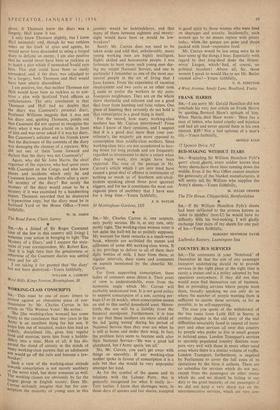WORKING-CLASS CONSCRIPTS
SIR.---This must be one of many letters to Protest against an obnoxious piece of con- descension by Mr. Charles Curran in his article on 'The Woman Voter.' He writes : She [the working-class woman] has come firmly to the conclusion that two years in the Army is an excellent thing for her son. It keeps him out of mischief, makes him lead an orderly, disciplined life, gives him regular food and exercise, turns him from a hobble- dehoy into a man. Most of all, it has dis- persed the cloud of anxiety in the minds of Many working-class parents that an adolescent son would go off the rails and become a law- breaker.'
Such a view of the working-class attitude towards conscription is not merely snobbery of the worst kind, but sheer nonsense as well. The working classes are obviously by far the largest group in English society. Does Mr. Curran seriously imagine that but for con- scription the majority of young men in this
country would be hobbledehoys, and that many of them between eighteen and twenty- eight would have been or would be law- breakers?
Surely Mr. Curran does not need to be taken aside and told that, unbelievably, many young working men are highly intelligent, highly skilled and honourable people. I was fortunate to meet many such young men dur- ing my recent National Service, and one in particular I remember as one of the most suc- cessful people in the art of living that I have known. From the experience of vacation employment and two years as an other rank k came to prefer the workers to my petit. bourgeois neighbours. They are on the whole more charitable and tolerant and are a good deal freer from ,humbug and false values. One piece of humbug they certainly do not hold is that conscription is a good thing in itself.
For the record, how many working-class mothers has Mr. Curran interviewed? From what I know of their opinions, and I suspect that it is a good deal more than your con- tributor's, the majority are more opposed to conscription than middle-class mothers. Since working-class boys are not accustomed to leav- ing home for long periods and are frequently regarded as investments to show a return when they begin work, this might have been expected. The tone of the passage in Mr. Curran's article which I am sure must have caused a great deal of offence is reminiscent of nothing so much as of Southern anti-aboli- tionists speaking about those poor ignorant niggers, and for me it constitutes the most out- rageous piece of snobbery that I have seen for a long time.—Yotirs faithfully,
20 Mottinghant Gardens, SE9
J. H. NAYLOR


































 Previous page
Previous page